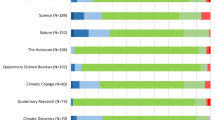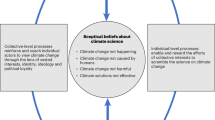Abstract
This study, using the discussion about climate change in the USA as an example, analyzes the research question of how climate change skeptics use experts and scientific evidence in their online communication. Two different strategies are distinguished: legitimation and criticism. The study conducts a quantitative content analysis of online documents to answer the research question. The results show that the deduced strategies are an important part of the communication of climate change skeptics, who more commonly use the criticism strategy than the legitimation strategy. Results are further differentiated for different actor types and various types of experts.




Similar content being viewed by others
Notes
Extensive pre-tests showed that a higher number of “source seeds” (i.e., starting points for the crawler software) resulted in networks that contained a great amount of noise and were too large to be processed further.
„climate change“or „global warming“or „Klimawandel*“or „globale* Erwärmung“, thus resulting in English and German websites.
The criticism of an actor with an opposing view often does not occur as a direct offense or insult but is mentioned more implicitly for example by making an actor appear ridiculous or by using a very ironic language style.
The codebook used is available at url (anonymized)
During the sample period of one year, for one actor (the blog “Watts Up With That?”), several different pages that dealt with climate change were coded. For the analysis, these single pages were aggregated at the actor level.
References
Amara N, Ouimet M, Landry R (2004) New evidence on instrumental, conceptual and symbolic utilization of university research in government agencies. Sci Commun 26:75–106
Anderegg WRL (2010) Moving beyond scientific agreement. Clim Chang 101:331–337
Bar-Ilan J (2005) Information hub blogs. J Inf Sci 31(4):297–307
Benkler Y, Faris R, Roberts H, Zuckerman E (2017). Study: Breitbart-led right-wing media ecosystem altered broader media agenda. Columbia Journalism Review. https://www.cjr.org/analysis/breitbart-media-trump-harvard-study.php Accessed 23 August 2017
Bentley AP, Petcovic HL, Cassidy, DP (2016) Development and validation of the anthropogenic climate change dissenter inventory. Environ Educ Res 1–16. https://doi.org/10.1080/13504622.2016.1250150
Boehmer-Christiansen S (1995) Reflections on scientific advice and EC transboundary pollution policy. Sci Public Policy 22(3):195–203
Bolsen T, Druckman JN (2015) Counteracting the politicization of science. J Commun 65:745–769
Boswell C (2009) The political use of expert knowledge: immigration policy and social research. Cambridge University Press, Cambridge
Boussalis C, Coan TG (2016) Text-mining the signals of climate change doubt. Glob Environ Chang 36:89–100
Boykoff MT, Boykoff JM (2004) Balance as bias: global warming and the US prestige press. Glob Environ Chang 14(2):125–136
Brulle RJ (2014) Institutionalizing delay: foundation funding and the creation of U.S. climate change counter-movement organizations. Clim Chang 122(4):681–694
Collins H (2014) Rejecting knowledge claims inside and outside science. Soc Stud Sci 44(5):722–735
Cook J, Lewandowsky S (2016) Rational irrationality: modeling climate change belief polarization using Bayesian networks. Top Cogn Sci 8(1):160–179
Cook TD, Levinson-Rose J, Pollard WE (1980) The misutilization of evaluation research: some pitfalls of definition. Knowledge 1:477–498
Cook J, Nuccitelli D, Green SA, Richardson M, Winkler B, Painting R, Way R, Jacobs P, Skuce A (2013) Quantifying the consensus on anthropogenic global warming in the scientific literature. Environ Res Lett 8:1–7
Cook J, Lewandowsky S, Ecker U (2017) Neutralizing misinformation through inoculation: exposing misleading argumentation techniques reduces their influence. PLoS One 12(5):e0175799
Coombs WT (2002) Assessing online issue threats: issue contagions and their effect on issue prioritisation. J Public Affairs 2(4):215–229
Coombs WT, Holladay SJ (2012a) Fringe public relations: how activism moves critical PR toward the mainstream. Public Relat Rev 38:880–887
Coombs WT, Holladay SJ (2012b) Privileging an activist vs. a corporate view of public relations history in the U.S. Public Relat Rev 38(3):347–353
Corbett JB, Durfee JL (2004) Testing public (un)certainty of science: media representations of global warming. Sci Commun 26(2):129–151
Dahlgren P (2005) The internet, public spheres, and political communication: dispersion and deliberation. Political Communication 22(2):147–162
Dunlap RE, McCright AM (2011) Organized climate change denial. In: Dryzek JS, Norgaard RB, Schlossberg D (eds) The Oxford handbook of climate change and society. Oxford University Press, Oxford, pp 144–160
Dunlap RE, McCright AM, Yarosh JH (2016) The political divide on climate change: partisan polarization widens in the U.S. Environ: Sci Policy for Sustainable Development 58(5):4–23
Elgesem D, Steskal L, Diakopolous N (2015) Structure and content of the discourse on climate change in the blogosphere: the big picture. Environ Communication 9(2):169–188
Farrell J (2016) Corporate funding and ideological polarization about climate change. PNAS 113(1):92–97
Freudenburg WR, Gramling R, Davidson DJ (2008) Scientific certainty argumentation methods (SCAMs): science and the politics of doubt. Sociol Inq 78(1):2–38
Friedman SM, Dunwoody S, Rogers CL (eds) (1999) Communicating uncertainty. Media coverage of new and controversial science. Lawrence Erlbaum, Mahwah
Häussler T, Adam S, Schmid-Petri H, Reber U (2017) How political conflict shapes online spaces: a comparison of climate change hyperlink networks in the United States and Germany. Int J Communication 11:3096–3117
Hoffman AJ (2011) Talking past each other? Cultural framing of skeptical and convinced logics in the climate change debate. Organization Environ 24(1):3–33
Jaques PJ, Dunlap RE, Freeman M (2008) The organization of denial: conservative think tanks and environmental skepticism. Environ Politics 17(3):349–385
Jasanoff S (1987) Contested boundaries in policy-relevant science. Social Studies Sci 17:195–230
Javeline D, Shufeldt G (2014) Scientific opinion in policymaking: the case of climate change adaption. Policy Sci 47:121–139
Kalton G (1990) Introduction to survey sampling. Sage, London
Klastrup L, Pedersen PS (2006) Blogging for the election: the use and function of blogs as communication tool in a Danish Parliament election campaign. Internet research annual 2005 – Selected papers from the Association of Internet Researchers Conference 2005
Kriesi H (2004) Strategic political communication: mobilizing public opinion in ‘audience democracies’. In: Esser F, Pfetsch B (eds) Comparing political communication: theories, cases, and challenges. Cambridge University Press, Cambridge, pp 184–212
Leenen M, Penders B (2016) Dissident dietary credibility: the power of discontent. Sci Commun 38(5):551–573
Maasen S, Weingart P (2005) What’s new in scientific advice to politics? In: Maasen S, Weingart P (eds) Democratization of expertise? Exploring novel forms of scientific advice in political decision-making. Springer, Dordrecht, pp 1–19
McCright AM, Dunlap RE (2000) Challenging global warming as a social problem: an analysis of the conservative movement’s counter-claims. Soc Probl 47(4):499–522
Medimorec S, Pennycook G (2015) The language of denial: text analysis reveals differences in language use between climate change proponents and skeptics. Clim Chang 133:597–605
National Science Board (2016) Science and Engineering Indicators 2016. National Science Foundation. https://www.nsf.gov/statistics/2016/nsb20161/#/report/chapter-7/interest-information-sources-and-involvement Accessed 24 August 2017
Nordhagen S, Calverley D, Foulds C, O’Keefe L, Wang X (2014) Climate change research and credibility: balancing tensions across professional, personal, and public domains. Clim Chang 125:149–162
Painter J, Ashe T (2012) Cross-national comparison of the presence of climate scepticism in the print media in six countries, 2007–10. Environ Res Lett 7(4):1–8
Peters HP (2008) Scientists as public experts. In: Bucchi M, Trench B (eds) Handbook of public communication of science and technology. Routledge, London, pp 131–146
Pielke RA Jr (2004) When scientists politicize science: making sense of controversy over The Skeptical Environmentalist. Environ Sci Policy:405–417
Sarewitz D (2004) How science makes environmental controversies worse. Environ Sci Policy 7:385–403
Schäfer MS (2012) Online communication on climate change and climate politics: a literature review. WIREs Clim Change 3:527–543
Scheufele DA (2014) Science communication as political communication. PNAS 111(4):13585–13592
Schmid-Petri H, Adam S, Schmucki I, Häussler T (2015) A changing climate of skepticism? The factors shaping climate change coverage in the US press. Public Understanding of Science. Online first, doi: https://doi.org/10.1177/0963662515612276
Shackley S, Wynne B (1996) Representing uncertainty in global climate change science and policy: boundary-ordering devices and authority. Sci, Technol Human Values 21:275–302
Sharman A (2014) Mapping the climate sceptical blogosphere. Glob Environ Chang 26:159–170
Shumate M, Lipp J (2008) Connective collective action online: an examination of the hyperlink network structure of an NGO issue network. J Comput-Mediat Commun 14(1):178–201
Smithson M (1993) Ignorance and science: dilemmas, perspectives, and prospects. Sci Commun 15:133–156
Stone D (2001) Getting research into policy. Paper presented at the Global Development Network, Conference on ‘Blending Local and Global Knowledge’, Rio De Janeiro, 10th December 2001
Taylor M, Kent ML, White WJ (2001) How activist organizations are using the Internet to build relationships. Public Relat Rev 27(3):263–284
Valovirta V (2002) Evaluation utilization as argumentation. Evaluation 8:60–80
van der Linden S, Leiserowitz A, Rosenthal S, Maibach E (2017) Inoculating the public against misinformation about climate change. Global Challenges 1(2):1–7
Weingart P (1995) Scientific expertise and political accountability: paradoxes of science in politics. Sci Public Policy 26:151–161
Ylönen M, Litmanen T, Kojo M, Lindell P (2017) The (de)politicisation of nuclear power: the Finnish discussion after Fukushima. Public Underst Sci 26(3):260–274
Zürn M (2014) The politicization of world politics and its effects: eight propositions. European Political Sci Rev 6(1):47–71
Funding
This publication was created in the context of the Research Unit “Political Communication in the Online World” (1381), subproject 7, which is funded by the DFG, German Research Foundation. The subproject is also funded by the Swiss National Science Foundation (SNF, 100017E-135915).
Author information
Authors and Affiliations
Corresponding author
Electronic supplementary material
ESM 1
(DOCX 80 kb)
Rights and permissions
About this article
Cite this article
Schmid-Petri, H. Politicization of science: how climate change skeptics use experts and scientific evidence in their online communication. Climatic Change 145, 523–537 (2017). https://doi.org/10.1007/s10584-017-2112-z
Received:
Accepted:
Published:
Issue Date:
DOI: https://doi.org/10.1007/s10584-017-2112-z




